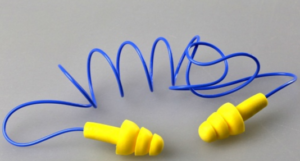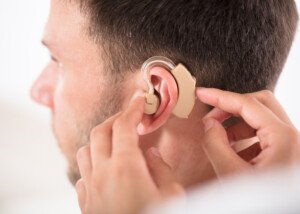
Does a dislike for loud noise—even a hatred for it—always have to mean that you have hyperacusis or an abnormal sensitivity to sound?
What if someone hates loudness because they are very vigilant about preventing hearing loss?
To say that they necessarily have hyperacusis is akin to saying that a person who always wears sunscreen is ultra-sensitive to the sun’s rays.
NO. How about that person simply wants to prevent skin cancer?
Hearing Health Conscious vs. Hyperacusis
“Hyperacusis is a nonspecific term, defined in assorted and sometimes confusing ways,” says Bryan Pollard, president of the nonprofit Hyperacusis Research, which funds scientific research into noise-induced pain.
Pollard explains that hyperacusis can be described as follows:
• “Sound sensitivity”
• “Decreased sound tolerance”
• “Heightened awareness of sounds”
• “Discomfort for sounds that would be acceptable to most normally-hearing people”
• “Noise-induced pain” and more.
Let’s take “heightened awareness of sounds.” Wouldn’t this be more likely a sign of keen hearing rather than some abnormal sensation?
If you can hear a wall clock ticking and someone beside you can’t, does that mean you have some kind of overly sensitive hearing issue?
Or maybe the person next to you has dulled hearing from attending night clubs too often without ear plugs!
Imagine someone with eyesight way better than 20/20 – as in, 20/5. You might say that they have a “heightened awareness of sights.”
For example, they can make out a bird on a lamp post far away, while those with 20/20 vision might just barely see a bump and not know what it is.
Does this mean that the person with 20/5 vision has a problem with perceiving scenery?
Pollard continues, “Hyperacusis is a symptom, often resulting from noise overexposure or a head injury. It can be caused by ototoxic drugs or some diseases such as Lyme disease.
“It is also a condition unto itself, which presents along a continuum of severity, from mildly annoying to life-ruining.
“Hyperacusis patients generally perceive sounds as louder than normal. As severity increases, noise becomes pain. It’s a burning pain, along with additional jabbing or stabbing pain upon noise exposure.
“The intensity of the pain differs with the sound’s volume, duration and frequency. For many, a single new noise exposure can produce pain that remains for hours, days or indefinitely.”
Hating Loud Noise Not the Same As Feeling Pain from Normal Volume or Stabbing Pain from Louder Noise.
For example, a person might detest the sounds of a preschooler screaming and shrieking – not because it causes physical pain or a jabbing feeling in the ear, but because that person knows that such piercing shrill noise can damage the nerve cells in the inner ear.
Thus, being caught off guard to the subjection of such noise would be very aggravating to this individual.
Another good analogy is the inhalation of secondhand smoke. The actual smell of cigarette smoke might be perceived as tolerable by a very health-conscious individual.
Yet at the same time, if that person is forced to inhale secondhand smoke due to proximity, it can be a very unpleasant experience – simply because that person is aware of the dangers of secondhand smoke. This doesn’t mean they are hypersensitive to the smoke!
Bryan continues, “Out in the regular world, complaints about loud noise aren’t uncommon. One example: Wedding music is unpleasantly loud.
“Another: The clinking from emptying the dishwasher is irritating. Or a passing siren is so loud you stick your fingers in your ears.
“When the noise goes away, all is back to normal. This kind of mild sensitivity doesn’t rise to the level of hyperacusis, where ordinary noise or surprise noise causes such lingering discomfort and pain that the condition interferes with normal life. There is almost no place on earth without auditory risk.
“The difference is comparable to other dislikes. Someone may dislike coconut, but if they mistakenly eat coconut, they don’t suffer for weeks.
“Someone else may have an allergy to peanuts, however, and exposure to peanut dust gives them a serious anaphylactic reaction, far beyond what normal people experience and in some cases life-threatening.
Solutions
“Prevention is currently the only solution for hyperacusis and other noise-induced hearing disorders, including hearing loss and tinnitus, or ringing in the ears.

Wearing ear plugs where there might be loud noise does not mean someone has “sensitive” ears any more than wearing elbow pads while inline skating means that person has “sensitive” elbows!
“Ears don’t behave like other body parts, and damage builds up unnoticed. The best advice is to avoid loud noise or use ear protection. If it seems too loud, it IS too loud.”
One of the aforementioned descriptors of hyperacusis is “discomfort for sounds that would be acceptable to most normally-hearing people.”
This is an example of how the definition of hyperacusis has been so broadened, that those who are simply hearing health conscious are often labeled as having “ultra-sensitive” ears or some kind of problem with their hearing.
If loud noise is acceptable to an allegedly normal-hearing person, maybe the explanation is that the tolerant person has enough hearing loss to blunt the loudness of the noise that the hearing health conscious individual is “ultra-sensitive” to!
For those wanting to prevent as much hearing loss as possible, your best bet is custom made ear plugs.
• Wear them everywhere in public, because you just never know when there will be an unexpected loud sound (screaming baby/toddler, dropped glass/china, slamming door, car horn, tire screech).
• Loosen them up if you can’t quite make out what someone is saying to you. Otherwise, keep them in good.
• After all, do you really need your ear canals fully open just to shop at the store or work out at a gym?

 Bryan Pollard passed away in 2022.
Bryan Pollard passed away in 2022.







































